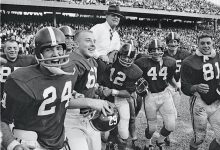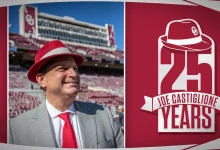Gregg Popovich’s legendary coaching run is over, but the Spurs will see the Pop Way continue for years to come

The NBA is a league steeped in history, filled with players and coaches who have left indelible marks on the sport. Yet, few individuals have defined a franchise quite like Gregg Popovich has with the San Antonio Spurs. Popovich, one of the most successful and influential coaches in NBA history, has announced his retirement after an unparalleled run that spanned over two decades. His legacy, both as a coach and as a person, is cemented in the annals of NBA history, but even as his coaching chapter closes, the “Pop Way” will continue to echo through the Spurs’ organization for years to come.
To understand the significance of Popovich’s career and his lasting impact on the Spurs, it’s essential to look at how he shaped the franchise, how his coaching philosophy became synonymous with success, and why the “Pop Way” will remain a guiding principle even in his absence.
The Rise of Gregg Popovich: A Journey to Coaching Immortality
Gregg Popovich’s path to becoming one of the most legendary coaches in NBA history was anything but conventional. Popovich’s love for basketball began as a player, but it was his shift to coaching that would ultimately shape his legacy. After a brief stint as a player and a few years in coaching positions at the collegiate level, Popovich was hired as the head coach of the San Antonio Spurs in 1996.
At the time, the Spurs were a team that had seen some success but was not yet a dominant force in the NBA. It didn’t take long for Popovich to change the trajectory of the franchise. Under his leadership, the Spurs quickly became one of the most successful teams of the late 1990s and early 2000s. His ability to build teams around a system of ball movement, disciplined defense, and unselfish play became the foundation of what would become a dynasty.
Popovich’s first major accomplishment came in 1999, when the Spurs captured their first NBA championship. That victory marked the beginning of a dominant run that would include five NBA championships (1999, 2003, 2005, 2007, and 2014). His leadership, which prioritized team chemistry and collaboration over individual success, formed the backbone of this success. Popovich’s consistent ability to adapt and evolve his coaching style to suit the talent at his disposal allowed him to build a sustained winner in San Antonio.
The Pop Way: Philosophy, Principles, and Legacy
The “Pop Way” became more than just a coaching strategy—it became a philosophy that defined how the Spurs operated both on and off the court. At its core, the Pop Way is about embracing team-first principles, holding players to high standards, and fostering a culture of mutual respect and accountability.
- Emphasis on Team Basketball:
The Spurs were known for their “beautiful game,” a style of basketball characterized by unselfish ball movement, smart decision-making, and a commitment to playing for one another. Popovich prioritized team-oriented play over individual accolades. His offenses were built around passing, spacing, and finding the best shot, rather than focusing on isolating a single player. Whether it was Tim Duncan, Tony Parker, Manu Ginóbili, or any other member of the Spurs dynasty, the Pop Way ensured that every player had a role and contributed to the success of the team. - Defense as the Foundation:
Under Popovich, the Spurs became known for their suffocating defense. Popovich built his teams around defensive principles that were both smart and disciplined. His ability to construct elite defensive squads allowed the Spurs to consistently compete for championships. Even in his later years, when the Spurs’ offense became more dynamic, the defensive foundation remained intact. Popovich’s teams always understood the importance of stopping the ball, contesting shots, and working together as a unit to shut down the opposing offense. - Developing Talent:
One of Popovich’s greatest strengths was his ability to get the most out of players, both established stars and role players alike. Tim Duncan, who is often considered the greatest power forward of all time, thrived under Popovich’s tutelage, evolving his game and becoming an all-time great. Popovich also found value in overlooked players, such as Manu Ginóbili, who was drafted late, and Tony Parker, who was selected with the 28th overall pick. These players became pivotal parts of the Spurs’ success, embodying the underdog spirit that Popovich instilled in his teams. - A Commitment to Leadership and Accountability:
Popovich was known for his straightforwardness and for holding players accountable. His tough-love approach may have been intimidating to some, but it ultimately built a culture of responsibility within the Spurs’ organization. Whether it was helping players grow as individuals or giving them tough feedback on their performance, Popovich’s coaching style was built on respect and honesty. His leadership went beyond just tactical decisions—it was about developing players as well-rounded individuals both on and off the court. - Adapting to Change:
Another cornerstone of Popovich’s coaching career was his ability to adapt. The NBA landscape evolved dramatically over the years, with the rise of three-point shooting, pace-and-space offenses, and advanced analytics. While many coaches struggled to keep up with the changes in the game, Popovich embraced them. He was never afraid to change his tactics to fit the modern NBA, adjusting his offense to take advantage of new trends like the three-point shot. Despite being known for his strong defensive and structured systems, Popovich proved to be forward-thinking, ensuring the Spurs remained competitive in a changing league.
The 2014 Championship and the Pinnacle of Popovich’s Legacy
While Gregg Popovich’s legacy is multifaceted and includes many accomplishments, the pinnacle of his career came in 2014 when the Spurs won their fifth NBA championship. That season was a testament to everything Popovich had built during his tenure in San Antonio.
The 2014 Spurs team is often viewed as one of the most beautiful teams in the history of the NBA, not only because of their on-court success but also due to the way they played the game. They displayed a brand of basketball that epitomized the Pop Way—an offense that flowed through ball movement and unselfish play, and a defense that was consistently on point. In the 2014 NBA Finals, the Spurs dismantled the Miami Heat, led by LeBron James, in five games, showcasing their superior teamwork, poise, and skill. The Spurs’ victory in 2014 was a fitting conclusion to a dynasty that was built on collaboration and smart basketball.
The success of the 2014 team also symbolized Popovich’s adaptability as a coach. While the Spurs had been known for their methodical, grind-it-out style in previous years, the 2014 squad embraced a fast-paced, pass-first philosophy that led to one of the most efficient offenses in NBA history. Popovich’s willingness to evolve and embrace change, even in the latter stages of his career, ensured that the Spurs remained relevant and competitive in the ever-changing NBA landscape.
Life After Popovich: The Continuation of the Pop Way
While Popovich’s retirement marks the end of an era for the San Antonio Spurs, the influence of his coaching philosophy will continue to shape the franchise for years to come. Popovich has set a high standard for success, and his legacy has been ingrained in the Spurs’ organizational DNA. The “Pop Way,” which emphasizes teamwork, defense, and a culture of accountability, will continue to guide the team long after Popovich is gone.
- The Spurs’ Organizational Structure:
One of the key reasons the Pop Way will continue is the strong organizational structure Popovich has helped build. Over the years, Popovich has surrounded himself with capable assistants and leaders within the Spurs’ front office who share his vision for the team. Some of his assistants, like Becky Hammon and Mike Budenholzer, have already moved on to successful head coaching jobs, but they will undoubtedly carry the lessons they learned under Popovich with them. Additionally, the Spurs’ front office remains committed to continuing Popovich’s commitment to player development, team-first basketball, and community involvement. - The Spurs’ Culture:
The Spurs’ culture has been cultivated under Popovich’s leadership, and it is one that emphasizes mutual respect, humility, and a commitment to excellence. While there may be some changes in the way the team plays under a new head coach, the Spurs’ emphasis on creating a family-like atmosphere within the organization will remain. Popovich’s legacy is about more than just wins and losses—it’s about how the franchise operates on a day-to-day basis. That culture will be passed down to future generations of Spurs players, ensuring that the Pop Way endures. - The Next Generation of Spurs Players:
While the current iteration of the Spurs may be in a rebuilding phase, the franchise is positioning itself for future success. The Spurs’ recent success in the NBA Draft, including landing a generational talent like Victor Wembanyama, suggests that the team will be competitive once again soon. As these young players develop, the principles that Popovich instilled in the organization will serve as a blueprint for their growth. Whether it’s Wembanyama or any other young star, the teachings of Popovich will continue to resonate, providing the foundation for future championships. - Popovich’s Lasting Influence on Coaching:
Beyond the Spurs, Popovich’s influence will continue to be felt across the entire NBA. His coaching philosophy has inspired countless other coaches, both at the professional and collegiate levels. Many NBA coaches who followed in his footsteps, including Steve Kerr, Mike Budenholzer, and Monty Williams, have adopted Popovich’s teachings on leadership, team-building, and adaptability. The “Pop Way” will continue to shape the coaching profession, ensuring that his influence remains pervasive.
A Legacy That Will Last
Gregg Popovich’s legendary run as the head coach of the San Antonio Spurs may be over, but his influence will never fade. His coaching principles, his emphasis on team play, his commitment to excellence, and his ability to adapt will live on in the Spurs organization for years to come. The “Pop Way” is more than just a style of basketball—it’s a philosophy that has shaped a franchise, developed countless players, and created a lasting legacy of success.
As the Spurs look to the future, they will do so with the knowledge that the foundation Popovich built is strong. Whether it’s through the players, coaches, or front-office executives who were shaped by his leadership, the impact of Gregg Popovich’s tenure will continue to resonate in San Antonio and the NBA for generations to come. The Pop Way will not just be remembered; it will continue to define what it means to be a San Antonio Spur.









